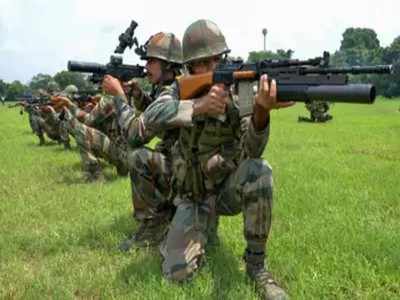- News
- India News
- Won’t tolerate adultery, homosexuality: Army
Trending
This story is from October 31, 2019
Won’t tolerate adultery, homosexuality: Army
The Army remains steadfast that it will not tolerate homosexuality or adultery in its ranks despite SC judgements decriminalizing them last year. The force is clear that action will be taken for “unbecoming conduct” under Section 45 of the Army Act of 1950. Lt Gen Ashwani Kumar said, "the Army will abide by the law of the land" but "something which is legal may not be ethical."

Image used for representative purpose.
Key Highlights
- The Army remains steadfast that it will not tolerate homosexuality or adultery in its ranks despite SC judgements decriminalizing them last year
- Lt Gen Ashwani Kumar said, "the Army will abide by the law of the land" but "something which is legal may not be ethical, and vice-versa," he added
NEW DELHI: The Army remains steadfast that it will not tolerate homosexuality or adultery in its ranks despite Supreme Court judgements decriminalizing them last year. The force, in fact, is quite clear that it will continue to take action against officers and soldiers for “unbecoming conduct” under Section 45 of the Army Act of 1950.
But the over 12-lakh force is certainly grappling with a legal conundrum after the Supreme Court judgments struck down the relevant colonial-era sections from the Indian Penal Code (IPC), which in turn have already led to quashing of a few court martial proceedings by civilian courts.
Asked if the armed forces will seek a review of the Supreme Court judgments to ensure military personnel are excluded from their ambit, the Army’s outgoing adjutant general Lt-General Ashwani Kumar said, “How do you know we haven’t already done so?”
Lt-Gen Kumar, who retired on Thursday, said, “Supreme Court's judgments are the law of the land and the Army will abide by them.”. But the Army follows “a certain code of ethics” to ensure good military order and discipline in its ranks. Something which is legal may not be ethical, and vice-versa, he added.
The armed forces in many western countries like the US and Canada have moved over the decades from an earlier blanket ban on homosexuality to “Don't Ask, Don't Tell” policies to now finally allowing gays, lesbians and bisexuals to serve openly in the ranks without any discrimination.
In India, military personnel are governed by their respective Army, Navy and IAF Acts, which come down heavily on “unbecoming conduct and actions” that may not strictly be criminal acts under the IPC.
The armed forces, for instance, consider extra-marital affairs a serious crime because they adversely impact the spirit of brotherhood and loyalty fostered in the military, where husbands often leave their wives behind in “separated family” accommodation in cantonments on being posted to forward or field areas. Officers indicted for such acts usually face court martial or are summarily sacked, sometimes without pension and other benefits.
But the over 12-lakh force is certainly grappling with a legal conundrum after the Supreme Court judgments struck down the relevant colonial-era sections from the Indian Penal Code (IPC), which in turn have already led to quashing of a few court martial proceedings by civilian courts.
Asked if the armed forces will seek a review of the Supreme Court judgments to ensure military personnel are excluded from their ambit, the Army’s outgoing adjutant general Lt-General Ashwani Kumar said, “How do you know we haven’t already done so?”
Lt-Gen Kumar, who retired on Thursday, said, “Supreme Court's judgments are the law of the land and the Army will abide by them.”. But the Army follows “a certain code of ethics” to ensure good military order and discipline in its ranks. Something which is legal may not be ethical, and vice-versa, he added.
General Bipin Rawat in January himself had stated that the Army was “conservative” and would not allow either consensual same-sex acts or extra-marital affairs – the latter euphemistically called “stealing the affections of a brother officer’s wife" in military parlance – “to perpetrate into the force”, as was then reported by TOI.
The armed forces in many western countries like the US and Canada have moved over the decades from an earlier blanket ban on homosexuality to “Don't Ask, Don't Tell” policies to now finally allowing gays, lesbians and bisexuals to serve openly in the ranks without any discrimination.
In India, military personnel are governed by their respective Army, Navy and IAF Acts, which come down heavily on “unbecoming conduct and actions” that may not strictly be criminal acts under the IPC.
The armed forces, for instance, consider extra-marital affairs a serious crime because they adversely impact the spirit of brotherhood and loyalty fostered in the military, where husbands often leave their wives behind in “separated family” accommodation in cantonments on being posted to forward or field areas. Officers indicted for such acts usually face court martial or are summarily sacked, sometimes without pension and other benefits.
End of Article
FOLLOW US ON SOCIAL MEDIA










